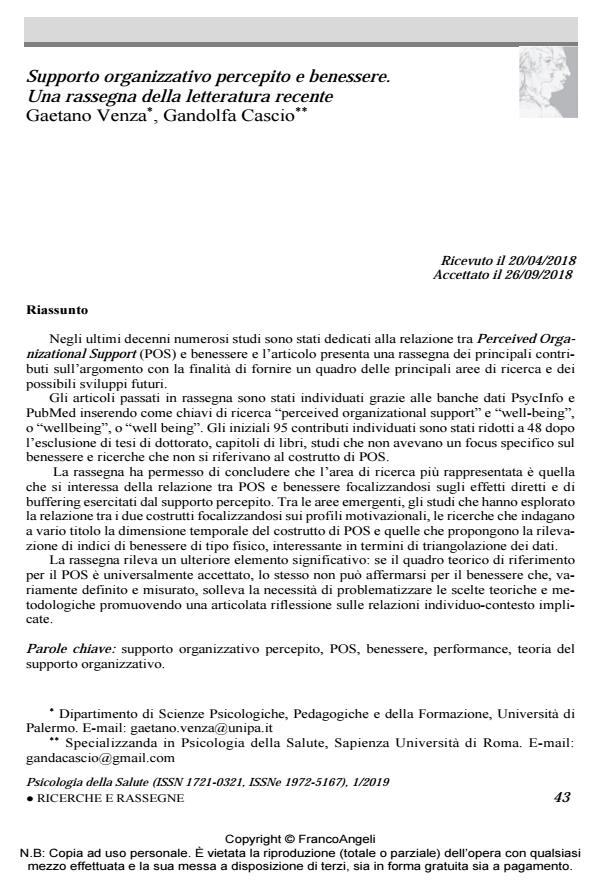Organizational Perceived Support and well-being: A review of the recent literature
Journal title PSICOLOGIA DELLA SALUTE
Author/s Gaetano Venza, Gandolfa Cascio
Publishing Year 2019 Issue 2019/1
Language Italian Pages 21 P. 43-63 File size 279 KB
DOI 10.3280/PDS2019-001003
DOI is like a bar code for intellectual property: to have more infomation
click here
Below, you can see the article first page
If you want to buy this article in PDF format, you can do it, following the instructions to buy download credits

FrancoAngeli is member of Publishers International Linking Association, Inc (PILA), a not-for-profit association which run the CrossRef service enabling links to and from online scholarly content.
In recent decades a number of studies have been published regarding the relationship be-tween Perceived Organizational Support (POS) and well-being. This narrative review aims to provide a critical survey of the extensive literature produced on this topic offering a synthesis of current thinking in the field and pointing out possible future developments. The contributions reviewed were identified by searching electronic databases PsycInfo and PubMed and inserting "perceived organizational support" and "well-being", or "wellbeing", or "well being" as research terms. Initially, 95 papers were identified as potentially relevant; however, after applying the exclusion criteria and eliminating dissertations, books chapters, studies that didn’t focus on well-being or POS, the number of papers was reduced to 48. The most relevant research area about the relationship between POS and well-being fo-cuses on direct and buffering effects of perceived support. Among the emerging topics, the study of motivational profiles, the research about the temporal dimension of POS, and the proposal, important in a perspective of data triangulation, of measuring well-being by mean physical indicators. The review reveals a further issue about well-being: if the researchers define unanimously the construct of POS, they propose different definitions of well-being using various assessment tools. A more critical reflection about theoretical and methodological frameworks is needed for a better understanding of relationship between individual and contextual aspects of well-being in the workplaces.
Keywords: Perceived organizational support, POS, well-being, performance, organizational support theory.
- Associations of Job Insecurity With Perceived Work-Related Symptoms, Job Satisfaction, and Turnover Intentions: The Mediating Role of Leader–Member Exchange and the Moderating Role of Organizational Support Giovanni Di Stefano, Gaetano Venza, Davide Aiello, in Frontiers in Psychology 1329/2020
DOI: 10.3389/fpsyg.2020.01329
Gaetano Venza, Gandolfa Cascio, Supporto organizzativo percepito e benessere. Una rassegna della letteratura recente in "PSICOLOGIA DELLA SALUTE" 1/2019, pp 43-63, DOI: 10.3280/PDS2019-001003